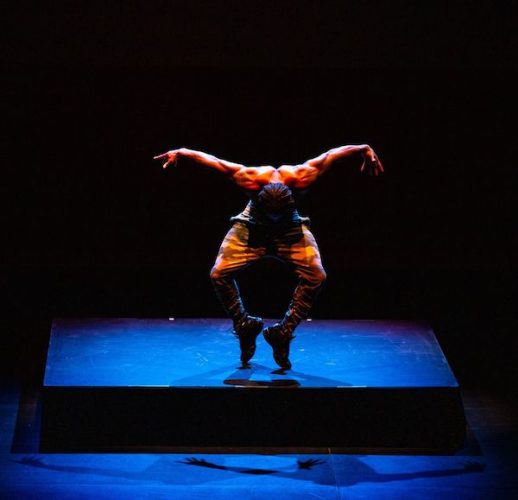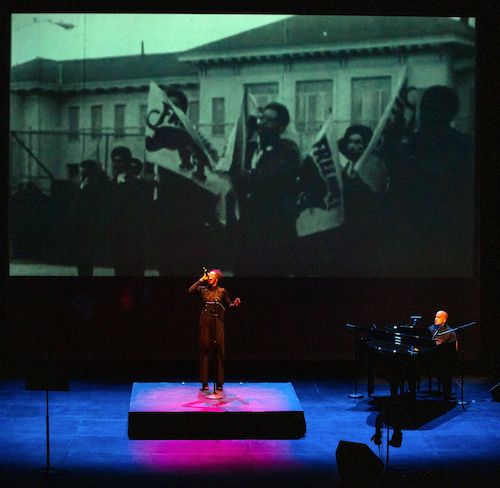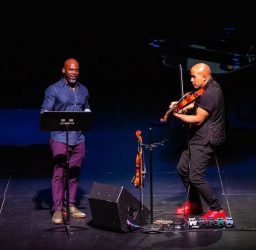Dance Review: “The Just and the Blind” — Shackled, Humiliated, Scared
By Jessica Lockhart
The Just and the Blind sends a needed and powerful message — it is 2022, we need to wake up!
The Just and the Blind, Conceived & written by Marc Bamuthi Joseph. Original music by Daniel Bernard Roumain. Directed by Michael John Garcés. At the Emerson Paramount Center, Boston. (Closed)

Dancer King Havoc in Celebrity Series of Boston’s production of The Just and the Blind. Photo by Robert Torres
This spring the Celebrity Series of Boston is presenting three programs that center on social justice. The first was Sankofa Danzafro’s haunting dance Accommodating Lie, which focused on slavery and racism. (Arts Fuse review) The second in the series was Marc Bamuthi Joseph’s The Just and the Blind, a multimedia project that explores — from the perspective of fathers of Black and Brown children — racial profiling, the injustices of sentencing, and the prison-industrial complex. This performance sends a needed and powerful message — it is 2022, we need to wake up!
The four-person ensemble packed an emotional wallop in an hour-long performance that featured live music, dance, storytelling, and gorgeous singing. The opening scene featured a giant blurred-out image projected high above the stage. It had the mysterious resonance of abstract art. Then the show’s creator, Marc Bamuthi Joseph, walked on stage: he talked about how fearful he felt, as a father, having to deal with his 16-year old son driving. His unease was heightened because his boy had officially entered his “prime suspect” years in the eyes of the police. As he spoke the image came into focus and we saw a close-up of a Black boy’s face.
Bamuthi Joseph tells us that he was arrested many times as a young man for minor infractions. He knows his Black son will be a target for special police scrutiny. Will his son, he wonders, be savvy enough to survive these encounters? A skilled storyteller, Bamuthi Joseph speaks with enormous musicality and grace. As for the power of his writing, here is part of that opening monologue:
“I have to say, you know, today’s not the day where I don’t love my son enough to tell him, Kid, I actually don’t care about your rights. Your mission is to get home to me, live to tell me the story, boy, get home to me…. Driving while Black is its own genre of experience.… The boy driving, the cop in the rearview mirror is a ticket to ride or die. When you give a Black boy the talk you pray he is of the faction of the fraction that survives. You telepathically pitch in the frequency of a final goodbye.… Responding to the Call of America and its worst strike us down. The music lives a cosmos of tobacco or sugar or cotton in muddy water. Get home to me son like a love supreme, a god as love, a love overrules feathers for the angelic lift of the restless dead, or a theme for troubled man, or 16-year old boy free to make mistakes and live through them. Grow from them. Holy, Holy, Mercy. Mercy, Mercy. Mercy, Mercy.”

Débo Ray and Daniel Bernard Roumain in Celebrity Series of Boston’s production of The Just and the Blind. Photo: Robert Torres
The performance was made up of a number of vignettes, each offering a different perspective on family life. The show’s message may be unmodulated but the evening was far from one-note: these stories were funny, explosive, tender, courageous, and angry.
Interwoven throughout the performance were striking photographs of young Black children with their parents and grandparents. Animated drawings and video footage, along with these images, were also projected. We watched scenes from a Black Panther rally and the historical march on Birmingham.
The four performers took turns on stage. Some turns were solo, at other times the performers interacted with one another. Dancer King Havoc from Brooklyn interpreted a Bamuthi Joseph text via a Flexin’ dance that drew on dancehall, reggae, and hip-hop styles. The Flexin’ movements were intricate and showcased various body parts of the dancer. With mesmerizing precision, King Havoc went from movements of undulating wave-like lushness to a succession of twitching contortions. Memorably, at one point he created a silhouette that captured the agony of a person with a tortured soul.

Bamuthi Joseph and Daniel Bernard Roumain in the Celebrity Series production of The Just and the Blind. Photo by Robert Torres
Collaborator and composer Daniel Bernard Roumain created an original score, a beautiful sonic soundscape. Onstage, he played both the piano and electric violin, shaping his music to intensify the spoken words. The sound from the violin moved with ease from the joyous to the violent. At times his violin playing was so deep and harmonious it sounded as if he were playing a cello. The fourth performer, Débo Ray, is a Grammy nominated vocalist and a Berklee alumna and professor. She sang two original songs written by Bamuthi Joseph that were inspired by the writings of Dr. Martin Luther King and Assata Shakur. The powerful lyrics matched her forceful vocals.
Other audio heard throughout the performance were voice-overs by incarcerated youth talking about their lives and lessons learned. Melancholic as they were to hear, these confessions confirmed the tragic problem we have with the criminal justice system and people of color.
“Shackled, humiliated, then scared,” recalled Bamuthi Joseph about the time he was handcuffed, encircled by police officers. He was being detained for parking in a bus stop. Afraid for his life, he recalls the words he wanted to be remembered by: “Bury me in the struggle for freedom.”
The final program in this three-part series examining social justice features the Alvin Ailey Dance Theater at the end of April. The Celebrity Series should be congratulated for programming uncompromising performances that directly address oppression. This is an organization that is not shying away from presenting dramas that explore America’s disgraceful history of treating people of color as second-class citizens — or worse.
Jessica Lockhart is a National Endowment for the Arts Fellow in Dance Criticism and has a BA in Communication from the University of Southern Maine. Lockhart is a Maine Association of Broadcasters award-winning independent journalist. Currently, she also works as program director at WMPG Community radio.
